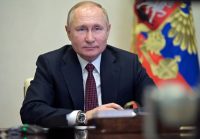
Ukraine to the world: keep calm and stop spreading panic
Kyiv, jokes one of its residents, is the eye of the hurricane, the calm spot at the centre of the storm. Life in Ukraine’s capital carries on as normal. But fears of impending chaos and destruction are closing in.
For weeks the US has been warning of a massive Russian military build-up along Ukraine’s borders. Hardened by eight years of war since Russia’s annexation of Crimea in 2014 and orchestration of a separatist war in the Donbas region, many Ukrainians have been either unfazed or incredulous that President Vladimir Putin would go so far as to launch a large-scale invasion. Many still are.… Seguir leyendo »












